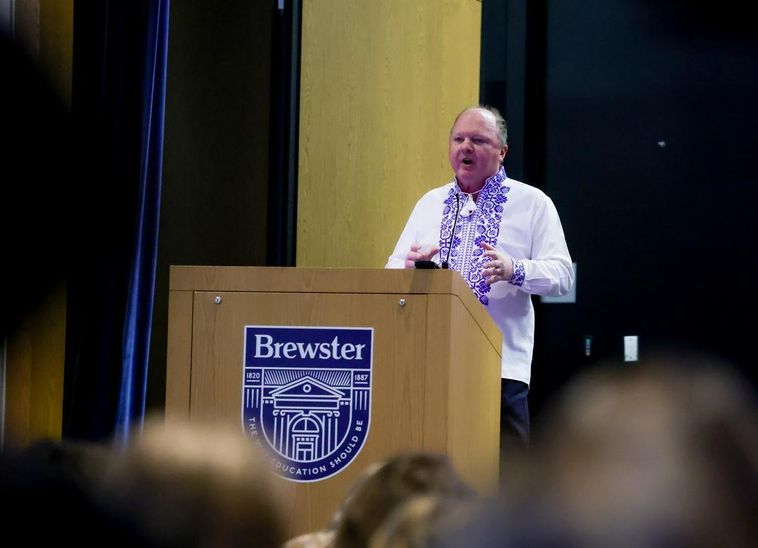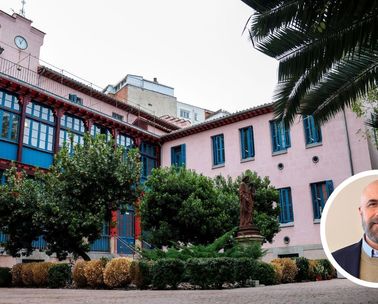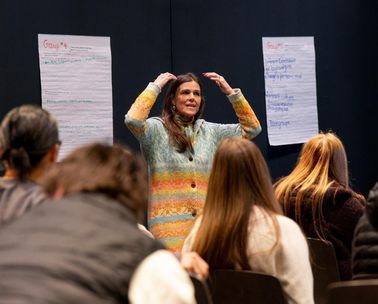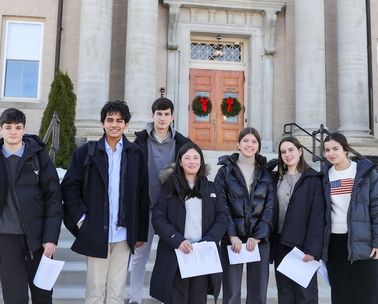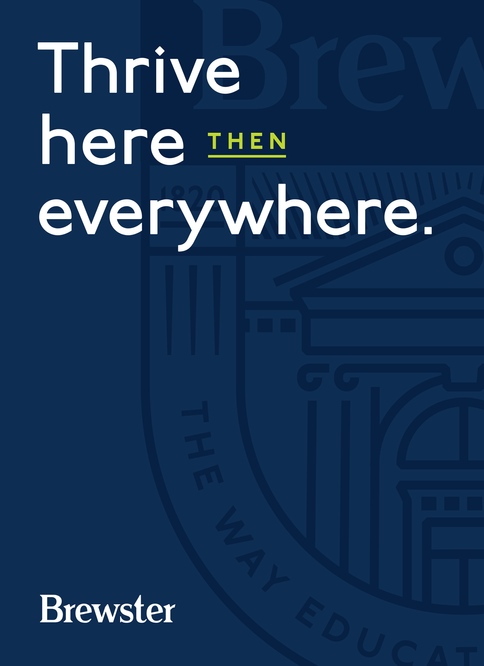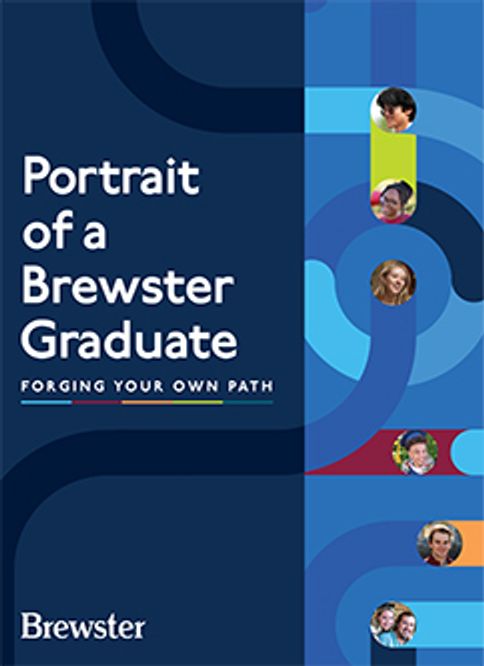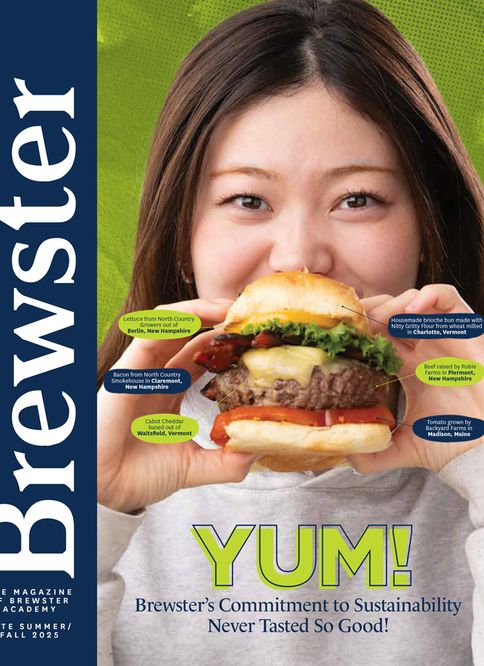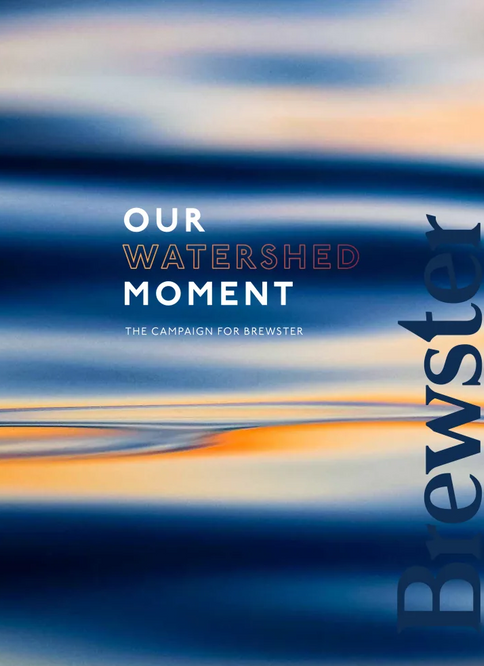

Scientific Thinking and Problem-Solving
At Brewster, science is all about curiosity, discovery, and preparing for the world ahead. Our dedicated faculty help students build the skills to tackle real-world challenges and think like scientists. From biology and chemistry to physics, you’ll dive into hands-on learning that sharpens your problem-solving and critical thinking. Once you’ve completed the core sciences, you can explore electives that spark your interest and take your learning even further.

Freshwater Biology
Explore the biology of lakes, rivers, and wetlands using Lake Winnipesaukee as your classroom. In Freshwater Biology, you’ll study ecosystems, investigate human impacts like climate change and invasive species, and get hands-on with fieldwork to learn how we can protect our waterways.
Science Courses
Biology
What does it mean to be living? Biology is a laboratory science course that offers a comprehensive exploration of living systems with the cell at its focus. Students will investigate the structure and function of cells and their organelles, mechanisms of cell transport, body systems, genetic inheritance, and the process of evolution and natural selection. Throughout this course, students will engage in a variety of activities designed to develop their problem-solving, inquiry, and science skills. As students explore biological concepts, they will also build their curiosity, creativity and collaboration skills as they learn how understanding Biology is key for understanding human health and current issues. Students are given a variety of opportunities to demonstrate their knowledge and the skills they acquire. Students build models, conduct laboratory activities, engage in experimental design and analyze data, and apply knowledge to case studies. This course will provide students with an overview of the life sciences and will serve as a foundation for future science coursework.
Chemistry
Chemistry is often called the central science as knowledge of this discipline allows for better understanding of life and physical sciences. Chemistry is a hands-on laboratory course where students develop scientific skills by conducting experiments, analyzing data, and presenting findings in formal reports. Students explore topics such as the scientific method, matter classification, atomic structure, periodic trends, chemical bonding, molecular structures, and chemical reactions. The course also covers stoichiometry and real-world applications of the mole concept. Later in the year, students will talk about real-world applications such as thermodynamics, kinetics, and systems in equilibrium. Through this process, students enhance their critical thinking and collaborative skills, working together to approach problems and think like scientists. Assessments include quizzes, labs, and tests, allowing students to connect chemistry concepts to their everyday lives and foster a deeper understanding of the material.
Physics
How can Physics be used to understand and explain the world around us? Physics is a lab science course that is intended to challenge students to develop critical thinking skills and gain an appreciation for the physical world around them. Students typically work collaboratively in the classroom and in the laboratory environment to learn kinematics, dynamics, momentum and energy, while also developing key lab skills. In the lab, students use a variety of sensors to collect data, and use spreadsheets and graphing programs for analysis. New concepts are typically introduced through collaborative lab activities. Once students have collected and organized data into tables and graphs, they are then tasked with the challenge of developing relationships and equations through discussion and graphical analysis. Students then apply this new understanding to increasingly complex problems. Skills are further developed as students originate, plan, and carry out experimental projects. Each module of study ends with a written exam and module project.
Anatomy and Physiology
In this lab-based science course, students will grow their understanding of how the body functions. Students will engage in group discussions and collaborative activities that include creating models, conducting experiments, collecting and analyzing data, and drawing conclusions all in an effort to answer fundamental key questions: How does the body function to maintain health? What happens if there is a malfunction? What lifestyle choices can be made to promote one’s health? Students will consider a variety of case studies and will utilize critical thinking skills to make decisions. Each trimester will explore the body with a thematic approach: Support and Movement, the Body in Action, The Human Machine: What Flows Within, The Three R’s: Regulation, Response and Reproduction. Anyone interested in pursuing a career in the health field should consider this introductory course.
Astronomy
This course teaches students to navigate the nighttime sky, using telescopes to observe the moon, nebulae, and star clusters. By exploring the sky, students gain insight into natural phenomena like seasons, moon phases, and celestial motions. Weekly nighttime observations include setting up telescopes, astrophotography, and viewing deep sky objects. Hands-on activities with planispheres and telescopes help students identify constellations and locate astronomical objects. Key topics include the celestial sphere, seasonal changes, and solar movement. The course covers the Moon’s geography and impact on Earth, as well as the Sun and other stars. A scaled solar system model illustrates planetary relationships. Astrobiology fundamentals are also explored, including the search for exoplanets. This interdisciplinary approach combines philosophy, chemistry, and planetary science. By the end of the course, students will appreciate the cosmos, operate telescopes, and recognize seasonal constellations, gaining a deeper understanding of astronomy’s exciting frontiers.
Freshwater Biology
How does human activity impact freshwater ecosystems and their biological processes? This course examines the biology of freshwater systems, beginning with the study of water's origin, movement, and physical properties, and how they relate to ecosystems such as lakes, rivers, and wetlands. Students will explore biological concepts like water chemistry, nutrient cycling, and the role of microorganisms, using Lake Winnipesaukee as a living laboratory. Students will investigate human impacts, including eutrophication, invasive species, and the effects of climate change on different communities, with a focus on understanding biological interactions and their consequences on ecosystem health. Students will be able to make connections between biology and ecology by exploring the diversity of life in freshwater ecosystems, including the organisms that inhabit the local watershed, such as macroinvertebrates and aquatic plants. Students will apply their knowledge by engaging in fieldwork and examining how humans can help restore and protect these ecosystems through sustainable practices.
Advanced Placement Biology
AP Biology is an upper-level science course that explores biological concepts, processes, and applications through inquiry-based learning and critical thinking. The course is structured around four Big Ideas. Evolution explains life’s diversity and unity through natural selection, where genetic variations influence survival and adaptation. A diverse gene pool ensures species resilience in changing environments. Energetics examines how organisms acquire and use energy to maintain homeostasis and sustain life. Efficient energy use is essential at individual, population, and ecosystem levels. Information Storage and Transmission focuses on genetic inheritance and how DNA transmits information across generations. Genetic variation promotes adaptability, while environmental factors influence gene expression. Systems Interactions explores complex biological interactions at molecular, cellular, and ecosystem levels, ensuring stability and response to environmental changes. Students develop essential science practices, including explaining biological concepts, analyzing visual data, designing investigations, using statistical tests, and constructing evidence-based arguments. Through labs, projects, and real-world applications, students gain scientific literacy, problem-solving skills, and a strong foundation for academic and career success in the biological sciences.
Advanced Placement Chemistry
Advanced Placement (AP) Chemistry is a laboratory science course that will introduce students to more advanced chemical concepts at an accelerated rate. The overarching goal is to prepare students to take the AP exam in the spring, but in a deeper sense students are preparing for college level chemistry. In AP Chemistry students will have the opportunity to build their understanding of chemistry as they further explore the concepts of (1) scale, proportion, and quantity; (2) structures and properties of substances; (3) transformations; (4) energy; and (5) equilibrium. Throughout the course students will develop critical thinking skills, experience a variety of laboratory equipment and techniques, and develop science skills that will prepare them for college-level science courses. Students enrolled in this course must have successfully completed Chemistry at the accelerated level and complete or concurrently enroll in Physics. Students will need to receive departmental approval.
Advanced Physics
Advanced Physics is an AP-level course that closely follows the AP Physics 1 curriculum with additional topics. It is a second-year physics course that is designed for students who have shown strong interest in the field. At the end of the course, students will be able to demonstrate an in-depth understanding of selected physics concepts and improve their critical thinking and problem-solving skills. Lab work and data analysis is a major part of this class. Students will develop the skills needed to record and synthesize data and information from general observations and experimental work at an advanced level. Topics include but are not limited to, advanced Newtonian mechanics (including circular and rotational dynamics), fluid mechanics, electricity, and sound & waves. Students enrolled in this course must have successfully completed Physics and Pre-Calculus at the accelerated level and receive department approval.
Engineering Design
This course is designed to prepare students to view the world as an engineer, finding solutions to everyday problems. Students are introduced to the Engineering Design Process and practice implementing it in a variety of problem-based projects. Through individual and collaborative work, students will explore computer aided design (CAD), 3D printing, automation, reverse engineering with a goal of developing creative, effective solutions for real world application. This course will encourage students to approach complex problems with ideas aimed at solutions and will empower students to design, document and share their innovations with their peers. This course is designed for students looking to explore applications of mathematics and technology for real world applications using the Engineering Design Process, and for students looking to develop problem-solving skills in an authentic environment with life-long relevance.
Robotics
This course introduces students to the basic concepts of robotics using a hands-on and experiential approach. Students will explore three main themes: design, fabrication and construction, and programming. The course will provide students with opportunities to explore 3D printing using computer aided design (CAD) software to fabricate parts for specific intention, to design feedback loops and overall programming structures by which robots achieve their ultimate desired goal. Students will consider design and fabrication in the first trimester, construction and programming in the second trimester, and testing and refinement in the third trimester.

